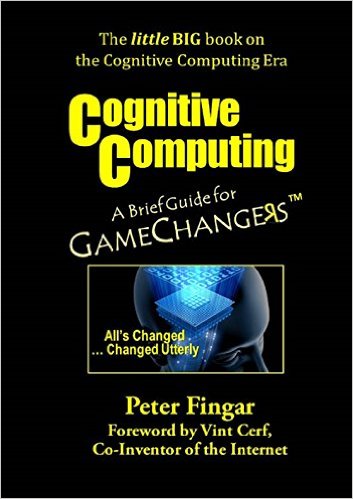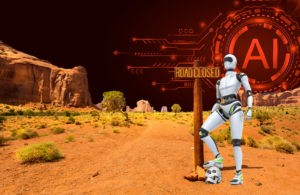Peter Fingar’s (@PeterFingar) book Cognitive Computing: A Brief Guide for GameChangers came to my attention when he emailed to say that he had included a quote from me that he lifted from a press release about Enterra Solutions® partnering with SAP®. In his email, Fingar wrote, “Because cognitive computing affects all sorts of work — and society as a whole — those leading the revolution must come together with one single voice to educate leaders, and the rest of us, for this monumental shift is as big a shift as the Industrial Revolution was to the Agricultural Age. We worked hard to make the book a concise easy read for today’s always busy people (78 pages) with definitive, watershed information at an affordable price to arm government and business leaders, and the rest of us, with the understanding that is needed to adapt … and re-adapt.” In fact, Fingar does pack a lot of information into this slim 78-page volume.
In the Foreword to the book, Vint Cerf, Chief Internet Evangelist at Google, wrote, “This is a remarkable and very up-to-date source book on serious work in cognitive computing.” Fingar’s Prologue states, “We’ve just entered a new era. Cognitive computing is an era in which machines will become better at most of what we do than we are.” IBM’s CEO Ginni Rometty (@GinniRometty) picked up on this theme and, at the 2016 International Consumer Electronics Show, declared, “It is the dawn of a new era, the cognitive era.”[1] Those are bold proclamations. As I noted in a previous article, the term “era” isn’t one that should be used lightly.[2] It is defined as “a long and distinct period of history with a particular feature or characteristic.” To call the coming years the cognitive era means that cognitive computing will be computing’s defining characteristic in the years ahead. Will cognitive computing measure up to that standard? Fingar’s book helps answer that question. He writes:
“The era of cognitive systems is dawning and building on today’s computer programming era. All machines, for now, require programming, and by definition programming does not allow for alternate scenarios that have been programmed. To allow alternating outcomes would require going up a level, creating a self-learning Artificial Intelligence (AI) system. Via biomimicry and neuroscience, Cognitive Computing does this, taking computing concepts to a whole new level. Once-futuristic capabilities are becoming mainstream.”
Unlike many articles — which start and end with IBM’s Watson — Fingar takes a broad look at the subject and he should be applauded for the effort. Not all approaches to cognitive computing are alike and Watson represents only one approach. Often I have to explain to clients the difference between the Enterra Solutions approach using the Enterra Enterprise Cognitive System™ (ECS) and IBM’s Watson. Watson is designed to respond to queries where the answer is found within a large corpus of documents. It analyzes massive amounts of data and provides a “best guess” answer (IBM calls it a “confidence-weighted response”) based on what it finds. In contrast, Enterra’s ECS is designed for queries where both semantic reasoning and advanced calculations are required to derive the answer. Enterra uses the world’s largest commonsense ontology as part of the semantic reasoning process. Fingar writes:
“In artificial intelligence research, commonsense knowledge is the collection of facts and information that an ordinary person is expected to know. The commonsense knowledge problem is the ongoing project in the field of knowledge representation (a sub-field of artificial intelligence) to create a commonsense knowledge base: a database containing all the general knowledge that most people possess, represented in a way that is available to artificial intelligence programs that use natural language or make inferences about the ordinary world.”
A commonsense knowledge base is important whenever a business executive is trying to gain actionable insights. As an example, an executive is not looking for an analysis that concludes dead people don’t buy any of the company’s products. A commonsense knowledge base helps weed out that kind of spurious result. It also helps systems using Natural Language Processing to “get it right” when trying to interpret data. An ontology allows cognitive computing systems to infer things about data, which is a capability that knowledge graphs don’t have.
Fingar points out that Thomas J. Watson, the late IBM Board Chairman after whom Watson was named, once stated, “I think there is a world market for about five computers.” I’m guessing he would be blown away by how computing has progressed during the seven decades that have elapsed since he made that remark. Fingar observes that data collection and storage have changed as dramatically as computing itself. During his discussion of data storage, he mentions SAP HANA and how Enterra has entered into an OEM agreement to integrate our Enterprise Cognitive System (formerly called our Cognitive Reasoning Platform) with the HANA platform. He writes, “Enterra will make rich analytics and insights available to enterprises and governmental agencies that seek to harness big-data insights to grow their businesses.” He then concludes, “Cognitive computing will have an enormous impact on the use of data in solving real world problems. The impact on fields like healthcare, education, finance, and legal (eDiscovery) are but examples where the power of technology has the chance to change entire industries. … What can be done with cognitive computing will be done.”
Fingar discusses topics as far-ranging as quantum computing and Industry 4.0. He gives examples of how cognitive computing can change a number of industries and even speculates how it could change society as whole. He provides arguments on both sides of the debate about whether artificial intelligence will be a benefit to mankind or result in our ultimate destruction. “Policy makers and societies need to prepare for future technology,” he concludes. “To do this well, they will need a clear understanding of how technology might shape the global economy and society over the coming decade.” Reading his book is a good start on obtaining that understanding.
Footnotes
[1] Mike Snider, “IBM’s Rometty heralds dawn of ‘cognitive era’, inks new Watson deals,”USA Today, 7 January 2016.
[2] Stephen DeAngelis, “The Era of Cognitive Computing,” Enterra Insights, 10 February 2016.





